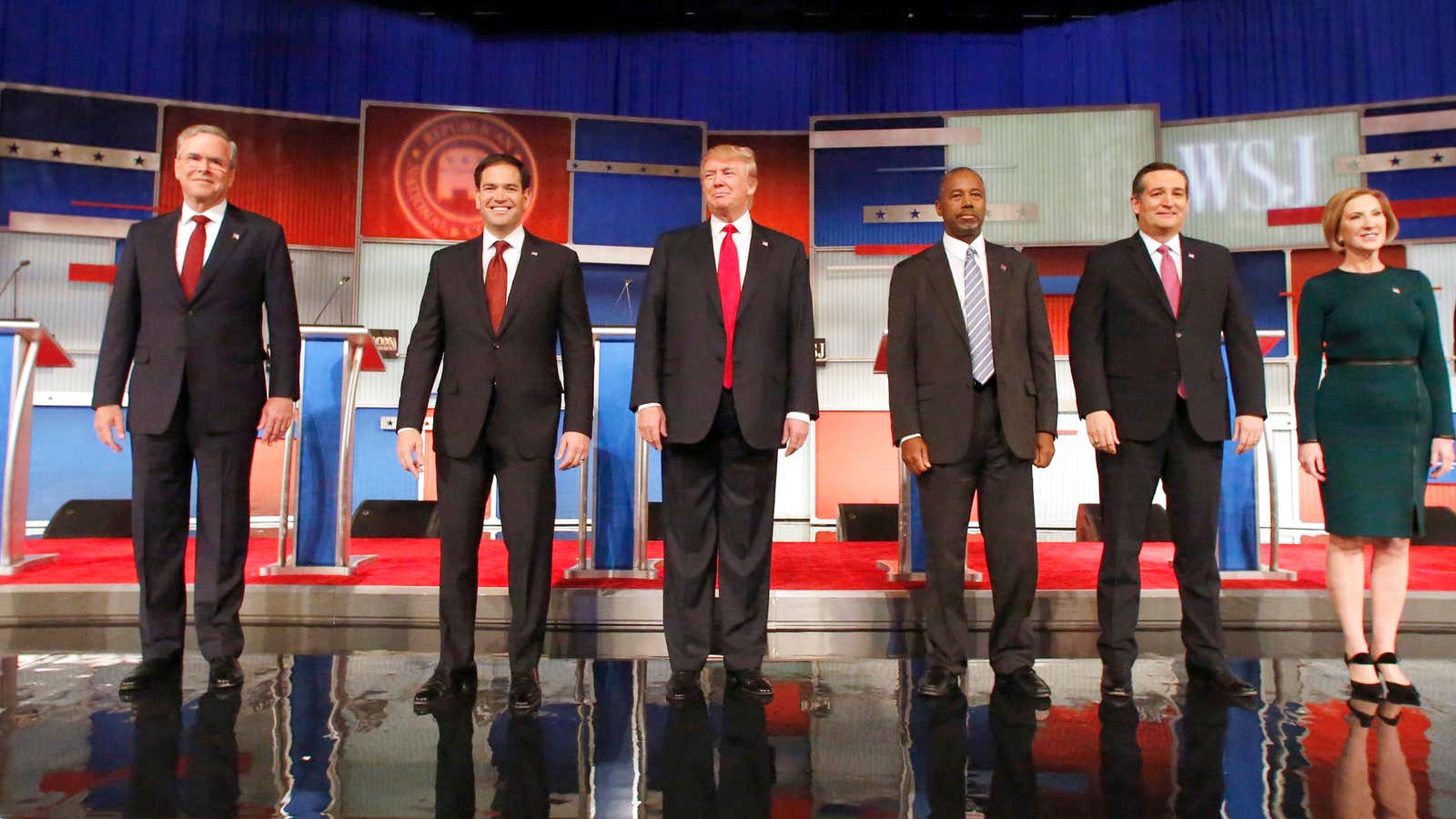Multi-billionaire Charles Koch announced yesterday that he has “no plans to support anybody” in the Republican primary. The most obvious way to interpret these comments is that no one in the current GOP field has stoked Koch’s excitement. But there are other ways to interpret his decision—all of which help us understand the relative value of different investments in politics.
1. A public endorsement could backfire
Koch may have reasonably concluded that his public endorsement of any single candidate could wind up hurting that candidate.
Consider the gains that Donald Trump has made with his resonant critique of the role of Super PACs in the Republican primary. We already know that Trump and the Koch brothers definitely do not get along. Koch could legitimately worry that his endorsement of any candidate would just be fodder for more righteous criticism from Trump (and perhaps others).
Besides, if there is a candidate Koch wants to support, the Koch brothers’ vast network of dark money organizations could provide that support without anybody knowing that it was his money. Just set up a new 501c4 organization and keep the funding secret.
Considered in this light, one wonders why any billionaire who wants to exert real influence on a campaign would make a public endorsement of a candidate. There are already so many ways to fund candidates without enduring the associated fanfare and scrutiny.
2. It’s always best to play hard to get
Another explanation for Koch’s decision is that by withholding his support, he strengthens his bargaining position. This is a fundamental rule of negotiation: you win more by playing hard to get. The minute Koch endorses somebody, the other candidates may stop trying to show how much they align with his values.
Sure, he says he has no plans to endorse anybody right now. But plans can change. And his brother David might still endorse somebody. The Kochs have a lot of money to sink into a candidate— they’ve already broadcasted plans to raise about $750 million for the 2016 election. That money that could provide a candidate with a crucial edge as the primaries heat up.
Once again, this line of thinking makes you wonder why any billionaire would endorse anybody at this point. All the fun in is getting the candidates to rearrange their schedules to give you private briefings, and then watch them rearrange their priorities to fit with your vision for America.
3. The Kochs’ money is better spent elsewhere
A third way to understand his decision is that any money spent on the Republican primary is probably wasted money. Why spend money there when it will just be used for Republicans to attack each other? And what if Koch’s top pick doesn’t get the nomination?
From Koch’s perspective, it might make more sense to save the money for the general election, when it can go toward painting Hillary Clinton in the most apocalyptic light possible. Or the money might be diverted to helping Republican candidates win close contests for House and Senate seats, or even sweep local elections.
Moreover, why not spend the money continuing to build up the Kochs’ conservative groups, which can help candidates at all levels? In 2014, the Koch-funded group Americans for Prosperity (AFP) beefed up its on-the-ground presence, developing voter databases and establishing a network of field directors. As AFP’s Iowa director told the Washington Post’s Matea Gold, “Basically, our field directors are community organizers … People used to make fun of President Obama’s background, but community organizing works.” The Kochs could easily keep up the expansion.
The Koch network has also been investing in candidate recruitment. As Politico’s Ken Vogel reports, AFP played a very active role in recruiting conservative Republican Joni Ernst to run for Senate in Iowa. As Vogel explains, “The Kochs and their allies are investing in a pipeline to identify, cultivate and finance business-oriented candidates from the local school board all the way to the White House.” This may also be a better investment.
Finally, the Kochs have also invested considerable and growing sums in the growing network of policy and research institutes that are building up the intellectual foundation for their small-government, free-market vision for America. In terms of winning the long game of shifting the public discourse, this may be their best investment.
In short, there are plenty of places where Koch money could be better spent than in the Republican presidential primary.
I have no doubt that Koch is a very savvy fellow. There are plenty of good reasons to hold back in supporting a candidate in the Republican presidential primary. In fact, if I had his billions, his reputation, and his vision, I’d probably do the very same thing.
